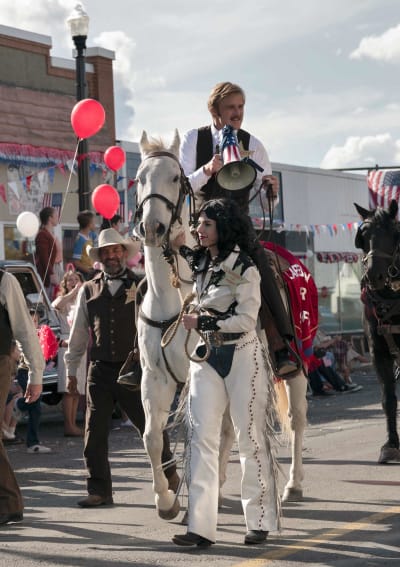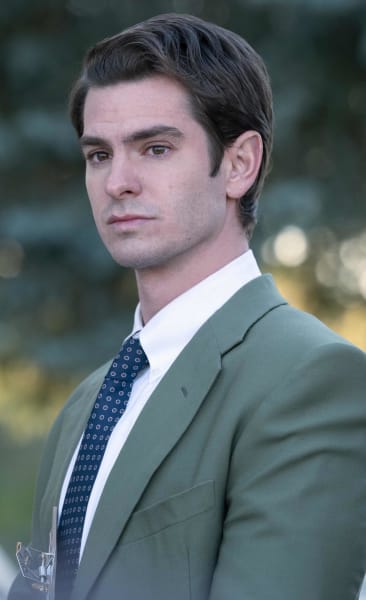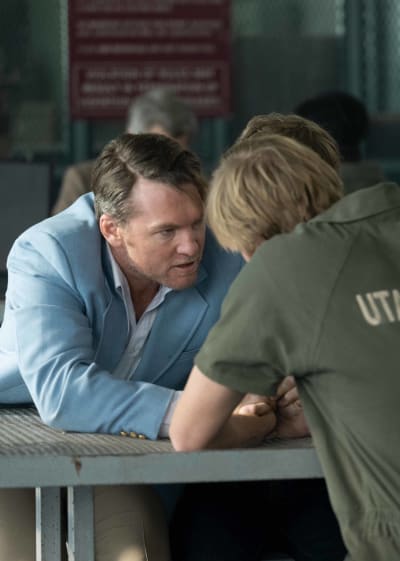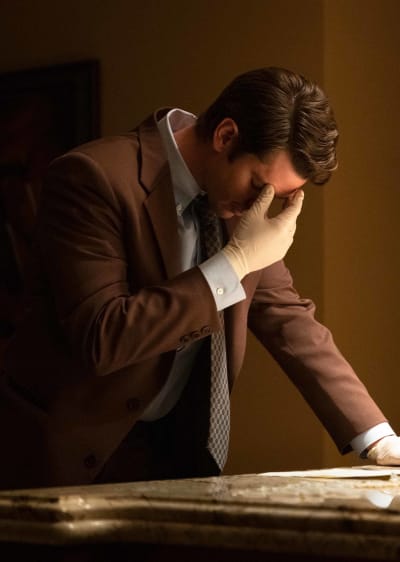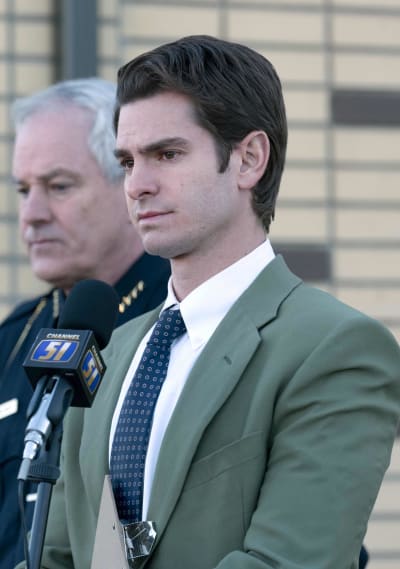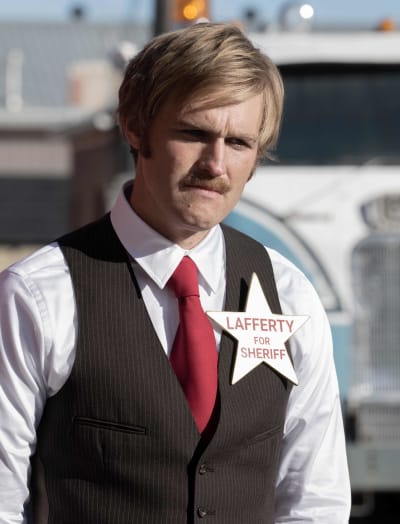It’s starting to feel like a disjointed puzzle with too many pieces.
Under the Banner of Heaven Season 1 Episode 4 is, unfortunately, feeling the crushing weight of its source material.
While there was a lot of information, the plot (such as it is) moved slowly as we learned more about Ron and Dan Lafferty.
Non-fiction crime can be challenging to adapt. When it’s done right, everything feels organic and seamless.
There is a delicate balance of how much information from the original case (and book) to include and how to distill it down to its essential elements to make it an engaging story.
There is so much information in this adaptation and occasionally it feels clunky in how it is presented to the viewer.
Material must be adapted for the medium. It feels very much like reading a book, but it should feel like watching a television show.
Some of the touches work well — the little flashes of memory or insight Jeb gets help give the information context and briefly touch on his way of processing it all.
It’s something that couldn’t be done in a book, and it helps connect Jeb to the case he’s trying to solve instead of making it seem like he’s outside of it. It has invaded his mind, and that aspect is done well, thanks to Garfield’s performance.
It can also be difficult to engage or hook viewers when the story is all being told in backstory. Episode 4 focused primarily on Dan Lafferty’s rise and fall, as well as his brother Ron. We haven’t met these two characters in “real life” yet, but Allen and Robin are again only narrators.
Despite all the backstory — maybe it’s the sheer number of characters — I still don’t feel like I know many of them, except for Jeb and Allen (and Brenda to a certain extent).
Dan is fundamentally (pun intended) a horrible person, and Wyatt Russell plays that smug, entitled persona for all it’s worth, unsure of his place in the family but firm in his belief that the Holy Spirit has spoken to him.
Our church vowed that if man’s laws ever conflicted with ours that we’d be ranged under the banner of heaven against the government.
Dan Lafferty
Ron’s “conversion” to fundamentalism is certainly a surprise here, if all the information provided by Allen and Robin is accurate. Where did he go, and did he take Dianna and their kids with him?
Despite all the information about Dan and Ron, there was no sign of present-day Sam, which seems like an oversight.
Perhaps he’s just too wild and crazy to get any concrete information from now, so the detectives need to focus on the Laffertys who can actually communicate with them.
It’s still unclear what this show is trying to say about religion and Mormonism. The chief deliberately spells it out — not all Mormons are bad, so don’t lump the fringe Fundies in with the law-abiding, “good” Mormons.
Our forebearers never fretted about how much they risked standing firm in their faith.
Dan Lafferty
However, this episode and Under The Banner Season 1 Episode 3 suggest that the regular Mormon church will go out of its way to protect the fundamentalists to prevent their actions from coming to light. Therefore, the modern Mormon church is complicit in any crimes the fundies commit.
The show seems to be stating that polygamists are evil in no uncertain turns — does that mean all polygamy eventually leads to murder? Or is it simply an explicit warning of the dangers of fundamentalist beliefs?
Jeb shows his true colors and is clearly wrestling with his conscience. Sometimes it feels a bit rote — the big bad church leaders keep telling him he needs to obey God, namely them, as they are God’s representatives on earth.
Jeb will no doubt find that his own moral compass is the one he should obey, as was evidenced by his unwillingness to hide the connection of the FLDS to the murders.
Jeb is a truth seeker who is now recalibrating the reality of his community. Church leaders are fallible. He will find his connection with God internally, not externally.
The journey itself is somewhat cliche, but again, Garfield imbues the character with such warmth and empathy that the story could be much less engaging without him. He loves his family above all else, and his non-Mormon peers respect him.
The parallels between Jeb and Allen are there, as two men who are on the opposite sides of the law, but Allen is further ahead in his journey or disengaging with the church. Jeb is starting to see the merit in that, having come a long way since Under The Banner Of Heaven Season 1 Episode 1.
I did what the church taught us us to do. Put my questions on the shelf. It’s hard to keep them up there, isn’t it?
Allen Lafferty
The complimentary nature of their characters makes Garfield and Howle’s scenes some of the best in the episode.
Unfortunately, some of the acting from the supporting characters fell flat here. It’s hard to be invested in the stakes when some actors bring uneven, unfocused energy.
However, Tyner Rushing, who plays Emma Smith, the prophet’s wife, stood out in a positive way. Rushing elevated her short scene in which she stood up to her husband, a powerful man she believed was straying from the path and growing more dangerous.
We made a vow, Joseph, and I will not stand to watch you say it is holy to marry others because you’ve grown bored of me.
Emma Smith
Her strength is mirrored in Daisy Edgar-Jones’ Brenda and their need to help these wayward men. Rushing and Edgar-Jones are physically similar, which has to be intentional.
If this were a play, Emma/Brenda would undoubtedly be a dual role played by the same actor.
Sadly, Brenda was mostly absent from this episode, save for a short scene with Dianna. Brenda is the heart of the story and the emotional impetus for the investigation. With her absence, things felt drier.
The episode begins with the investigation of the Lowes’ house and ends with the discovery of Bishop Lowe fly-fishing.
The stakes didn’t feel as high as they should have been. Did we truly think the Lowes had been murdered? Since we don’t really know them, it just didn’t hit right.
The show is still strong, but Episode 4 felt less compelling, and the pacing was off.
Jeb’s journey seemed disjointed and fractured, but maybe that was the point. Real-life crimes are messy, the details don’t always add up, and they don’t always reveal themselves in the correct order.
What did you think, fanatics? Are you still solidly engaged and invested in this story, or were you bored with this episode?
Share your thoughts in the comments!
Mary Littlejohn is a staff writer for TV Fanatic. Follow her on Twitter.
